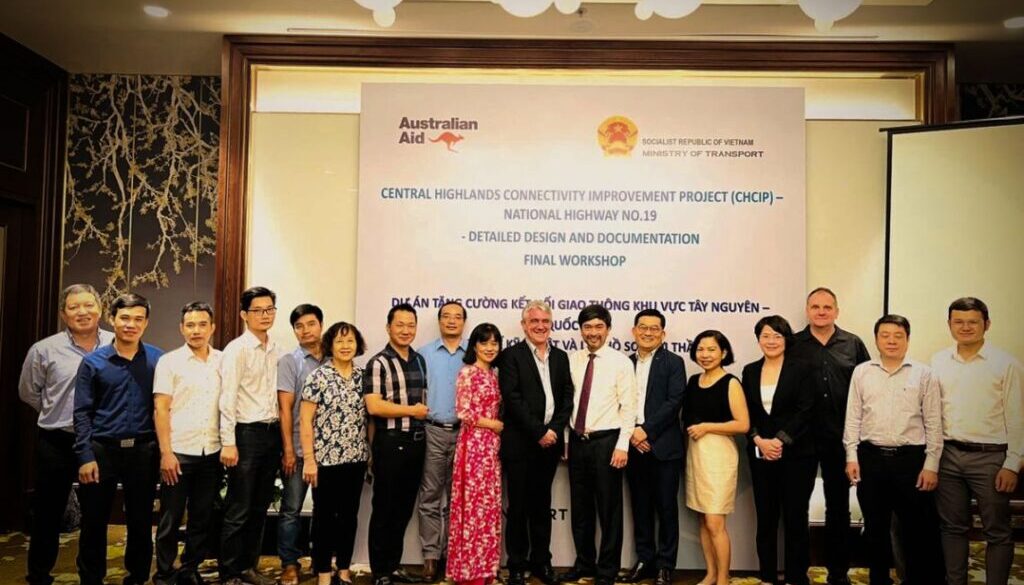Central Highlands Connectivity Improvement Project – Detailed Design and Documentation (DDD): Parties share experiences and lessons learnt during the final workshop
IN BRIEF
Aus4Transport, along with the Design Consultant and all related counterparts, met at the end of July to hold the final workshop for the Detailed Design and Documentation (DDD) of the Central Highlands Connectivity Improvement Project (CHCIP). The event marked the conclusion of the parties’ successful joint effort to finalise a high-quality design for National Highway 19, a major arterial highway connecting the port city of Quy Nhon with Cambodia and the Le Thanh border gate in Gia Lai province and provided an opportunity for the participants to review and assess the whole design process, including both engineering and non-engineering components.
The workshop was a productive exercise focusing on the challenges and successes experienced during the design process and helping to identify lessons learnt that will be considered for the planning and implementation of future projects. Aus4Transport is proud to be working together with the Ministry of Transport, supporting the development of an efficient road network that contributes to Vietnam’s socio-economic development.
KNOW MORE…
Aus4Transport, the Australian program supporting the Government of Vietnam to develop high quality transport infrastructure, marked another important milestone in July, by successfully organising the final workshop for the Central Highlands Connectivity Improvement Project (CHCIP) – Detailed Design and Documentation (DDD). The activity, which started in 2017, faced several challenges due to COVID-19, but strong collaboration between the project partners and the development and implementation of alternative strategic approaches allowed the activity to succeed. The CHCIP activity delivered the detailed designs and documentation for eight civil works packages, with all now approved and under construction.
CHCIP is an important development assistance project that contributes to the development of the Asian Highway system through the upgrade of 150 km of the National Highway 19 (NH19). As part of the Trans-Asia Highway, NH19 is one axis of the strategic road corridors in the Greater Mekong Sub-region (GMS), which connects Myanmar to Vietnam’s central coastal region through Thailand and Cambodia. The Trans-Asia Highway creates a major connection between GMS countries, especially the “development triangle” of Vietnam – Cambodia – Laos, and it is also an important connection point between the Central Highlands region and localities in the central and south-eastern regions.
CHCIP is co-funded by loans from the World Bank, a grant from the Australian Government, and counterpart funds from the Government of Vietnam adding up to a total investment of USD156 million (VND 2,500 billion). CHCIP is aligned with Vietnam’s strategic priorities that aim to boost shared prosperity and enable inclusive growth.
Aus4Transport has been collaborating with the Ministry of Transport and the World Bank on this project by providing funding and technical assistance to develop the Detailed Engineering Designs, bidding documents, and the environmental and social safeguard tools for all eight construction packages. Key priorities for this activity were to ensure the upgraded sections of NH19 incorporated climate resilience measures and met international three-star traffic safety standards. Along with road safety measures following International Road Assessment Program (iRAP) standards, the activity also considered social and economic risks and developed environmental, gender, resettlement, and ethnic minority development plans to ensure vulnerable groups are protected and benefit equally from the upgraded road. Aus4Transport’s design efforts ensured all technical and social dimensions of the project were comprehensively addressed and promoted long-term sustainable change, improving the overall quality of the project.
Gia Lai province has a population of 1.5 million people, with around 46% being ethnic minority peoples, and transport projects strive to include poor communities in project planning and implementation, as well as safeguarding their lives and livelihoods. While addressing the non-engineering components of the project, the activity undertook multiple surveys and consultations with affected communities to capture and better understand people’s perceptions, concerns, and priority needs. It also raised awareness about the environmental and social impacts related to the implementation of the project and ensured mitigation measures were developed and set in place, providing an umbrella of protection for the most-at-risk population. The final detailed designs complied with World Bank’s social safeguards policy to make transport accessible and safe for all, including women, the elderly, youth, vulnerable groups, and minorities.
Aus4Transport will continue to help enhance the quality of Vietnam’s transport infrastructure network and supporting socio-economic, cultural, and environmental development that directly contributes to the economic growth and poverty reduction efforts and priorities of the Vietnamese Government.




